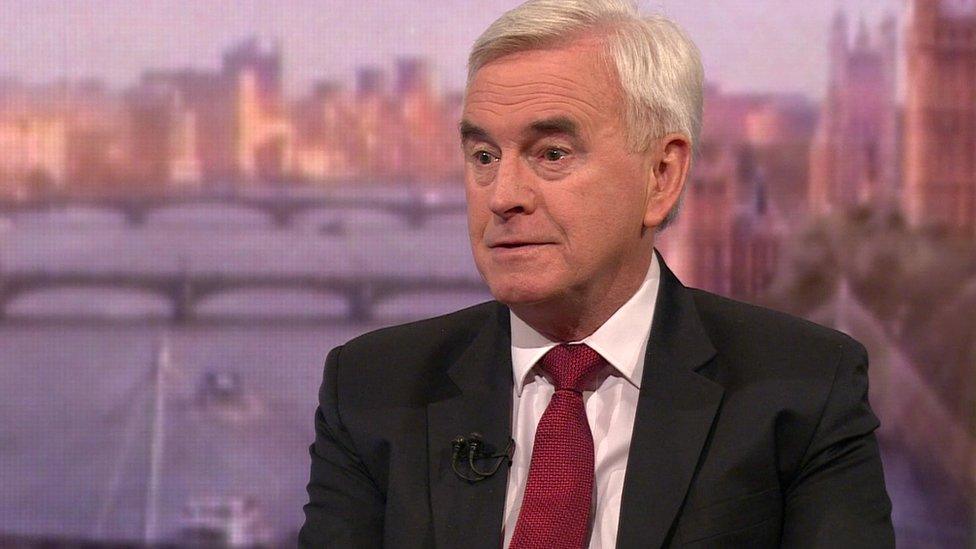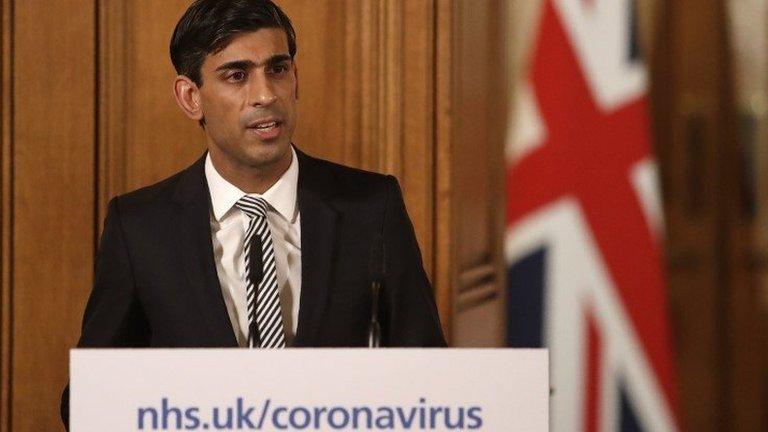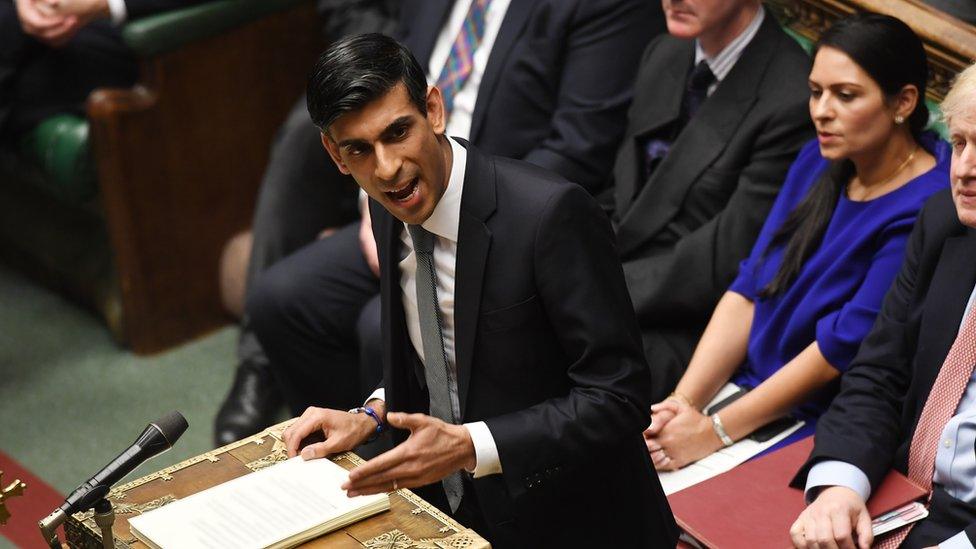Coronavirus: Government to pay up to 80% of workers' wages
- Published
Rishi Sunak: "The government is going to step in and help to pay people's wages"
The government will pay the wages of employees unable to work due to the coronavirus pandemic, in a radical move aimed at protecting people's jobs.
It will pay 80% of salary for staff who are kept on by their employer, covering wages of up to £2,500 a month.
The "unprecedented" measures will stop workers being laid off due to the crisis, chancellor Rishi Sunak said.
Firms have warned the virus could see them collapse, wiping out thousands of jobs, as life in the UK is put on hold.
Mr Sunak said closing pubs and restaurants would have a "significant impact" on businesses.
It is understood that the wage subsidy will apply to firms where bosses have already had to lay off workers due to the coronavirus, as long as they are brought back into the workforce and instead granted a leave of absence.
The chancellor said the move would mean workers should be able to keep their jobs, even if their employer could not afford to pay them.
He said they were "unprecedented measures for unprecedented times."
"I know that people are worried about losing their jobs, about not being able to pay the rent or mortgage, about not having enough set by for food and bills... to all those at home right now, anxious about the days ahead, I say this: you will not face this alone," Mr Sunak added
The wages cover, which relates to gross pay, will be backdated to the start of March and last for three months, but Mr Sunak said he would extend the scheme for longer "if necessary".
The scheme, which will be run by HMRC, is expected to make the first grants to businesses "within weeks", a Treasury spokeswoman said.
'Hugely welcome'
Employers' body the CBI said Mr Sunak's announcement was "a landmark package".
"It marks the start of the UK's economic fightback - an unparalleled joint effort by enterprise and government to help our country emerge from this crisis with the minimum possible damage," said director general Carolyn Fairbairn.
The Resolution Foundation think tank also said the package was "hugely welcome", reaching lower-paid workers that were most at risk of job losses.
But other lobby groups warned of the potential risk to firms which had to wait for the money to arrive.
Kate Nicholls, the chief executive of trade body UK Hospitality, said many businesses faced rent payments before the support was due.
"Banks and landlords need to do more to help us bridge the gap towards this generous government support. Damage is being done now, so we need help now."
The Federation of Small Businesses also warned the delay in wages help - potentially until the end of April - meant many small firms would still face "an immediate, potentially terminal cash flow crunch".
'Not alone'
The government has faced huge pressure to intervene to support workers to prevent mass unemployment as anti-virus measures have seen many firms' revenues evaporate almost overnight.
The wage package is the latest in a series of government moves aimed at easing the burden on businesses and their employees.
However, there was not the same wages guarantee for the self-employed. Instead, Mr Sunak increased benefits that many will have to fall back on.
Other measures to support firms and workers included:
VAT payments by companies deferred until the end of June
Interest free cash grants to small businesses
Self-assessment income tax payments for July 2020 deferred for six months
Increase in standard Universal Credit of £20 a week, with the same rise for those still on the working tax credit scheme
Nearly £1bn for those struggling to pay rent, through increases in housing benefit and Universal Credit
Capital Economics said that it expected the unemployment rate to rise from just under 4% to about 6% due to the crisis. However, without this latest government intervention, that rate would have risen to the financial crisis level of 8%, it said.


This move is an incredible intervention for any British government, let alone a Conservative one, but proportionate to the size of the terrible, but temporary, economic impact that could follow the coronavirus shutdowns.
In theory, it should save hundreds of thousands of jobs. Perhaps more. Employers have to accept that the government is doing something they would have never imagined a UK government to do.
At 80% cent of wages up to £2,500 a month it is a scheme more generous than some of the high welfare Scandinavian countries. It instantly transforms the social safety net of this nation.
It shows that the Treasury does believe that the very sharp plunge in the size of the economy can be followed by a bounceback - but not if millions of people are scarred by unemployment. Economics shows that these can have long lasting impact.
The chancellor was given the room for this partly by the Bank of England's biggest ever announcement of purchasing government debt.
There are risks if this pandemic lasts much longer than three months. But the risks of not acting were much greater.
Now it requires employers to hold their nerve until the payments begin at the end of next month. And for the banks to help that process.

- Published29 May 2020

- Published20 March 2020

- Published17 March 2020

- Published11 March 2020
